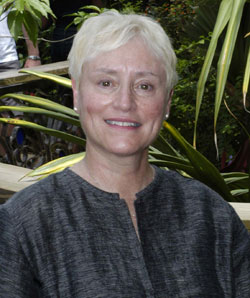USF part of $4.7 M NIH study on role of marijuana in adolescent HIV infection
Tampa, FL (Jan. 17, 2011) — The University of South Florida will collaborate with the University of Florida and the University of California-SanDiego on a $4.7-million National Institutes of Health study investigating the effects of marijuana use on immunity and HIV infection in adolescents.
HIV experts at the three universities were recently awarded the multidisciplinary grant, which could help identify novel biomarkers for tracking how substance abuse can influence the progression of HIV infection in the brain. It may also provide evidence to support behavioral guidelines for HIV-infected youth and yield clues about the best stage at which to start treatment with antiviral drugs.
USF is expected to receive $675,000 over the five-year life of the study.
The work, funded through the National Institute for Drug Abuse, is also a project of the Florida Center for AIDS Research, which is seeking NIH designation as a center of excellence for HIV/AIDS research.

USF’s Dr. John Sleasman is co-principal investigator for the NIH study.
While potent antiviral drugs have made HIV less deadly, movement and cognitive problems are still common among those infected – which could be particularly troubling for adolescents facing a lifetime with HIV.
Cannabinoids, the active compounds in marijuana, have been associated with suppression of the immune system and anti-inflammatory responses. However, it’s still unclear just how the compounds alter immunity or how they affect antiviral therapy or patient outcomes. Likewise, the effects of marijuana and other drugs on neurocognitive functions, such as thinking, memory and concentration, among HIV-infected youth are unknown.
The researchers will focus on marijuana’s major psychoactive component, a compound called THC that targets receptors in the brain, central nervous system and immune system.
The researchers previously found that about a third of HIV-infected youth regularly use, marijuana and less than 10 percent report other drugs, such as amphetamines, cocaine and opiates.
“No one really knows whether that is good, bad or indifferent in terms of disease progression,” said co-principal investigator John Sleasman, MD, the Robert A. Good professor and chief of the Division of Allergy, Immunology and Rheumatology in the USF Department of Pediatrics. “The question we’re trying to answer is how do we best advise young people about managing their disease.”
The researchers will use a cross-disciplinary approach to zero in on the overlapping effects of HIV infection and marijuana on the immune system and neurocognitive performance. USF will investigate the effect of cannabinoids on the immune system at the basic science level. UF will study HIV infected and HIV-free macrophages (white blood cells involved in immune response) using a technique call system biology to get a better picture of how marijuana compounds affect gene expression and subsequent proteins produced. UCSD will lead indepth assessments of motor function, thought processes, memory and reasoning to study effects of HIV on the brain.

UF’s Dr. Maureen Goodenow is principal investigator.
Study participants from ages 16 to 25 will be recruited from 15 sites across the country, including USF, through the NIH’s Adolescent Trials Network. The researchers will study youth taking antiretroviral therapy, others who are untreated because they do not meet department of health guidelines, some receiving treatment earlier than recommended, and a control group of individuals not infected with HIV. The groups will represent a wide cross section of age, gender, ethnicity and sexual orientation.
“Findings from this study could translate into better diagnostic tools and new therapies to improve long-term outcomes for young adults infected with HIV,” said principal investigator Maureen Goodenow, PhD, the Stephany W. Holloway university chair in AIDS research and professor of pathology, immunology and laboratory medicine at the UF College of Medicine.
USF’s Dr. Sleasman, who treats children with AIDS and other immune disorders at All Children’s, has been a principal or co-investigator for several NIH studies of HIV pathogenesis, therapy and prevention. He and UF’s Dr. Goodenow are working together on other NIH research designed to use certain autoantibodies from patients in the immunology and rheumatology clinics at All Children’s/USF and other institutions to help in creating an effective HIV vaccine.
Thomas Klein, PhD, professor emeritus of molecular medicine at USF, who contributed to the grant proposal, with be a volunteer consultant for the latest study. Dr. Klein has spent more than 25 years studying marijuana’s effects on the immune systems of mice, blowfish and human beings.
Content from a University of Florida College of Medicine story contributed to this article.

